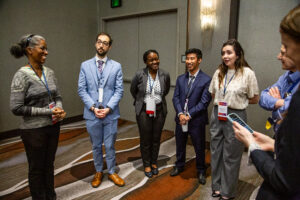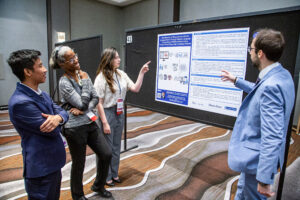
Dr. Ioannis Koulas presents a poster of his research to faculty and attendees at the 2024 Rheumatology Research Workshop.
There are some moments in life when you just feel like you are in the right place at the right time with the right people and you cannot believe how lucky you are to be there. If you read The Rheumatologist then you can understand that this is how I felt when I attended the 2024 Rheumatology Research Workshop at Denver, May 16–17.
Program Overview
This annual workshop is designed to bring together people with an interest in rheumatology research from different career stages, ranging from medical residents (like myself) to early and advanced investigators, both in adult as well as pediatric rheumatology, with the aim to pass knowledge from one to another, provide opportunities for mentoring and give practical advice on issues related to our academic progress as well as our wellness. In reality, it is more like a canvas of personalities and ideas where innovation, friendships and collaborations can be formed among like-minded people. We even had a Bingo game with fun facts about us, the attendees, that we had to quickly discover by interacting with each other, a fresh way to break the ice among us.
The program’s schedule included lectures on networking, work-life balance and funding opportunities open to all participants, intertwined with some lectures aimed at our career level (early vs. advanced investigators). These two concurrent tracks helped keep the lectures focused on our needs and made the experience even more personal as we had ample time to ask questions that could benefit everyone in the room. We then followed up these topics with some roundtable conversations between participants and members of the Early Career Investigator committee (ECI), where I was struck by how open and approachable the faculty were and how attentively they heard our personal worries in order to give us tailored advice.
Another key part of the program was our active involvement through the poster presentations and the elevator pitch, each designed to give our research exposure, as well as feedback on how to effectively present our research in a concise manner to a broader audience. I found the personal feedback from ECI members on our research and how to talk about it the most engaging part of the program and a unique aspect compared with larger conferences.

Dr. Ioannis Koulas presents a poster of his research to faculty and attendees at the 2024 Rheumatology Research Workshop.
My Personal Experience
I had some memorable moments interacting with the other participants during the workshop as well as outside, in the beautiful city of Denver. I am also grateful to the mentors we had during our small group sessions, namely Naomi Patel, MD, MPH, James Rosenbaum, MD, and Rebecca Sadun, MD, PhD, who were incredibly helpful in their feedback and guidance.
Another personal highlight was when I met the Rheum Champions. These incredibly hard-working patient advocates are devoted to raising awareness of rheumatic diseases and building communication bridges between physicians and patients. In our clinical work as physicians, it often easy to forget that we are not just treating a disease; rather, we work together with the patient to improve their lives, and it was beautiful for me to interact with these (true) champions as colleagues, discussing my research with them and getting feedback from their own perspective.
I also had the unique chance to have an inspiring “fireside chat” about the future of research in rheumatology with Liona Fraenkel, MD, MPH, vice president of the Rheumatology Research Foundation, as well as two Rheum Champions/patient advocates who have devoted their lives into improving patient education and standards of care.
The famous Greek philosopher and lawmaker, Solon, said, “I grow old ever learning many things” [in translation], which I think is a nice reflection of how impactful the Rheumatology Research Workshop can be to everyone who participates in it, thanks to the opportunities for close mentorship it provides to researchers from different career stages and backgrounds.
Learning is an integral part of our life from beginning to end, and the workshop is the perfect example of how the ACR strives to bring together its community to grow. In my case, I feel the feedback I received will help me advance my current research project, which happens to involve a different aspect of learning: training sophisticated privacy-preserving large language models for the identification of rheumatic disease flares from electronic health records.
Final Notes
I am grateful to Dr. Hannah Kim, MD, MS and Ms. Latonya Trower for the opportunity to express my experience of the workshop through this article, as well as the editorial team of The Rheumatologist for sharing my story. Finally, I would like to thank my project’s supervisor, Dr. Konstantinos Loupasakis for supporting my participation in the program and of course the ACR and the ECI subcommittee for this unforgettable experience!
Ioannis Koulas, MD, MSc, completed his medical studies in Greece, followed by a master’s degree in immunology and two years of post-doctoral research. He is currently an internal medicine resident at Jacobi Medical Center in New York City.


